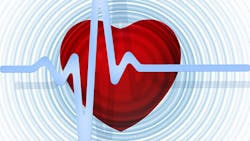Research findings a recent study published in the Journal of the American Heart Association (AHA) confirm the short-term risk consumers take when consuming energy drinks.
Drinking 32 oz. of an energy drink in a 60-minute timeframe directly affected the heart rhythm of the study's participants, a result bolstered by previous research.
“The public should be aware of the impact of energy drinks on their body especially if they have other underlying health conditions,” said lead author Sachin A. Shah, Pharm.D., professor of pharmacy practice at University of the Pacific, Thomas J. Long School of Pharmacy and Health Sciences in Stockton, Calif. “Healthcare professionals should advise certain patient populations, for example, people with underlying congenital or acquired long QT syndrome or high blood pressure, to limit or monitor their consumption.”
The study enrolled 34 healthy volunteers between 18 and 40 years old. Participants were randomly assigned to drink 32 oz. of one of two commercially-available caffeinated energy drinks or a placebo drink on three separate days. The drinks were consumed within a 60-minute period but no faster than one 16-oz. bottle in 30 minutes. Both energy beverages tested contained 304 to 320 milligrams of caffeine per 32 fluid ounces.
Shah and other resarchers examined the participants' hearts via electrocardiogram as well as recording blood pressure. Measurements were taken at the study’s start and every 30 minutes for four hours after drink consumption.
“We found an association between consuming energy drinks and changes in QT intervals and blood pressure that cannot be attributed to caffeine. We urgently need to investigate the particular ingredient or combination of ingredients in different types of energy drinks that might explain the findings seen in our clinical trial,” Shah said.
The QT interval is a measurement of the time it takes ventricles in the heart (the lower chambers) to prepare to generate a beat again. If this time interval is either too short or too long, it can cause the heart to beat abnormally. The resulting arrhythmia can be life-threatening, the AHA said.
According to the study's authors,the QT interval for those who consumed energy drinks was 6 milliseconds or 7.7 milliseconds higher at 4 hours compared to placebo drinkers.
Researchers also found a statistically significant 4 to 5 mm Hg increase in systolic and diastolic blood pressure in participants who consumed the energy drinks.
The completed study is the largest controlled study of the effects of energy drinks on the heart and blood pressure in young healthy volunteers.
Estimates indicate that about 30% of teenagers between the ages of 12 through 17 years in the United States consume energy drinks on a regular basis, which have been linked to increased emergency room visits and death.
“Energy drinks are readily accessible and commonly consumed by a large number of teens and young adults, including college students. Understanding how these drinks affect the heart is extremely important,” said study co-author Kate O’Dell, Pharm.D., professor of pharmacy and director of experiential programs at the Thomas J. Long School of Pharmacy and Health Sciences.
The study, which was supported by the University of the Pacific, was designed to assess the effects of short-term consumption of an energy drink and does not provide insight into long-term effects nor the effects of routine energy drink consumption.
About the Author

Stefanie Valentic
Stefanie Valentic was formerly managing editor of EHS Today, and is currently editorial director of Waste360.
